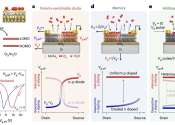Using skyrmions to create artificial synapses for neuromorphic computing
Skyrmions are ultra-stable atomic objects first discovered in real materials in 2009, which have more recently also been found also to exist at room temperatures. These unique objects have a number of desirable properties, ...









